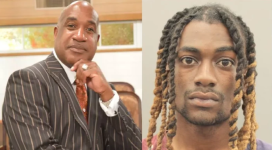
Hillsong Church New York City Pastor Carl Lentz has weighed in on the often-debated issue: Does the Bible permit Christians to get tattoos?
Speaking with World Religion News, Lentz, who has a number of tattoos, explained that Old Testament rules regarding body ink - Leviticus 19:28: "Do not cut your bodies for the dead, and do not mark your skin with tattoos. I am the LORD" - no longer apply today because of what Jesus did on the cross.
"Biblical interpretation is huge right. So with tattoos not being allowed you mean Leviticus. We play both sides of the coin I think that is healthy. Like this paradox of scripture, interpretation is actually is part of our faith, the tension of it. So, on one hand, we say that is the Old Testament scripture, there is no New Testament verification of that. That law that had to do with slaves, that identified you as part of a tribe we don't believe that came through the cross," Lentz said.
"We don't believe that when Jesus died and rose again that old Levitical scripture applied to our modern life. That is ridiculous," he continued. "At the same time, there are some things we do believe follow through on the cross. So, the way we break down we would literally put up the Old Testament and then put a cross in the middle and then we put up the New Testament and we say anything that comes through the cross is eternal. Anything that stops is Old Testament."
The popular pastor and author pointed out that in the Old Testament, animal blood sacrifices were required. However, because such ceremonial and civil laws have been fulfilled by the death and resurrection of Christ, such rules no longer apply to Christians
"Honoring your wife as God honors his church that comes through the cross. So that is our scope for all Scripture interpretation. If it died on the cross then it needs to die in our theology. Tattoos are a no-brainer. Are you kidding me? Jesus was pretty clear in every detail," he explained. "Whether it is diet, whether its image, whether it's qualification, that stuff died on the cross."
Still, Lentz said it's important for each person to adhere to their own convictions regarding body ink.
"If I don't believe these tattoos devalues the temple that is the Holy Spirit, my body, I am doing it. I do then I don't, but I am not going to turn my conviction necessarily into theology or doctrine," he said.
Currently one in five U.S. adults has at least one tattoo (21 percent) which is up from the 16 percent and 14 percent who reported having a tattoo in 2003 and 2008, respectively, by the Harris Poll.
Controversial pastor Mark Driscoll, head of the Arizona-based Trinity Church, previously weighed in on the issue, explaining that while he does not have any tattoos, he's not against them - and neither is the Bible.
" ... If you love Jesus, and you're of age, and your conscience is clear and you want to do it as an artistic expression - or maybe even to share your faith with a verse - I would say then it's between you and the Lord Jesus and I would give it to conscience, and I don't think there's anything in Scripture that expressly forbids it," he said.
Driscoll pointed out that Leviticus 19:26-30 is the "only one place in the Bible that seems to say you can't get a tattoo."
The former Mars Hill pastor explained the verse in context: In the days of the Old Testament, some Christians took part in the cultish, ancient pagan practice of marking and cutting their bodies in order to be affiliated with "the realm of the dead," essentially branding themselves like cattle.
Thus, the Bible isn't just referring to "any old marking of the body" in Leviticus.
"What God's people were not to do is brand themselves as if they belonged to some pagan god ... God wanted His people to not be doing things that were pagan and non-Christian, and demonic in nature," Driscoll said.
Today, however, we are "no longer under the law, we're under grace and the rule of Jesus."
"I'm not saying that we don't obey the Bible, and I'm not saying that it doesn't matter. I'm saying that when it's fulfilled by Jesus, we're no longer under and obligated to it," the pastor clarified.
While there is nothing wrong with getting a tattoo, Driscoll encouraged younger viewers think carefully about why they want a tattoo and whether or not getting one will honor their parents' wishes. He also urged those considering getting a tattoo to make sure it is not offensive in nature.
He added, "There's also nothing in Scripture that expressly commands it. So it's not something you have to do. I don't think it's something that you're forbidden to do. I think that it's something, in relationship with the Holy Spirit and wise counsel, you can do if you want to."







